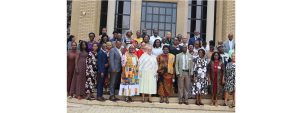 Sakeus Iikela
Sakeus Iikela
Vice President Lucia Witbooi has urged Namibians to view men as allies rather than obstacles to gender equality, saying that true progress depends on partnership between women and men.
“The journey of empowerment is not one of exclusion but of partnership. Men must not be seen as obstacles to gender equality, but as allies and advocates who share responsibility in building stronger families and societies,” Witbooi said.
She made these remarks during the official opening of the 8th Rural Women Parliament with Men as Partners (RWP) in Windhoek on Monday.She described the forum as “not merely a platform of dialogue but also a beacon of hope and empowerment for our rural communities, especially women,” and said it underscores “Namibia’s enduring commitment to inclusivity, gender equality, and social justice in the pursuit of sustainable development.”
RWP is a shadow parliament of the National Council of the Republic of Namibia.It provides a platform to empower rural women by enabling them and their male partners to debate and discuss matters of national interest that affect their livelihoods.
This week’s session – held under the theme: Breaking Barriers: Advancing Sustainable Support and Services for Rural Women and Men – brings together 42 participants from all 14 regions.Of these, 14 are men, participating alongside their female counterparts to promote consensus-building and joint solutions.
Reflecting on the session’s theme, Witbooi praised the contribution of rural women, calling them “the backbone of our agricultural economy, food systems, and family livelihoods.”She added, “Equally, rural men stand as partners in development – working alongside women to provide for their families and to uphold the values of dignity, responsibility, and progress.”
Witbooi commended the National Council for sustaining the Rural Women Parliament, calling it “this brilliant platform” which offers “opportunities for grassroots women and men to access information on socio-economic and political developments within the country; and to exchange experiences on how to deal with the challenges in their communities and at personal level.”
She said the Government remains “steadfast in advancing the rights and well-being of rural communities” through policies such as Vision 2030, NDP 6, the SWAPO Party Implementation Plan and the Sustainable Development Goals.But she cautioned that “despite these achievements, we also acknowledge that more still needs to be done especially in rural communities,” pointing to “poverty, limited access to health services, inadequate infrastructure, gender-based inequalities, and the harsh realities of climate change.”
Witbooi raised concern about “the scourge of gender-based violence and rising suicidal cases in our country” and urged participants to act as “positive role models” in their communities.“Together, as men and women, let us analyse, challenge and refrain from harmful cultural norms which advocate for dominance and violence,” she said.“By modelling positive behaviours and healthy relationships, women and men can teach the next generation about respect, equality, and non-violence.”
She concluded by appealing to all stakeholders “to work together with renewed resolve” to ensure that the Rural Women Parliament becomes “not only a platform of dialogue but a catalyst for action. Together, let us serve Namibians with dignity, and determination.”






